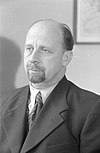General elections were held in East Germany on 17 October 1954. It was the second election to the Volkskammer, which had 466 deputies; due to the four-power status of the city of Berlin, the 66 deputies from East Berlin were indirectly appointed by the East Berlin magistrate.
| ||||||||||||||||||||||
All 466 seats in the Volkskammer | ||||||||||||||||||||||
|---|---|---|---|---|---|---|---|---|---|---|---|---|---|---|---|---|---|---|---|---|---|---|
| Turnout | 98.41% ( | |||||||||||||||||||||
| ||||||||||||||||||||||
| ||||||||||||||||||||||
As the country was a de facto one-party state, voters only had the option of approving or rejecting a single list of candidates from the National Front, dominated by the Communist Socialist Unity Party of Germany. The list received the approval of 99.46% of voters, with turnout reported to be 98.5%.[1]
Results
edit| Party or alliance | Votes | % | Seats | +/– | |||
|---|---|---|---|---|---|---|---|
| National Front | Socialist Unity Party of Germany | 11,828,877 | 99.46 | 117 | +7 | ||
| Free German Trade Union Federation | 53 | +4 | |||||
| Christian Democratic Union | 52 | –15 | |||||
| Liberal Democratic Party of Germany | 52 | –14 | |||||
| National Democratic Party of Germany | 52 | +17 | |||||
| Democratic Farmers' Party of Germany | 52 | +19 | |||||
| Democratic Women's League of Germany | 29 | +9 | |||||
| Free German Youth | 29 | +4 | |||||
| Cultural Association of the GDR | 18 | –6 | |||||
| Peasants Mutual Aid Association | 12 | 0 | |||||
| Against and invalid | 63,972 | 0.54 | – | – | |||
| Total | 11,892,849 | 100.00 | 466 | 0 | |||
| Total votes | 11,892,849 | – | |||||
| Registered voters/turnout | 12,085,380 | 98.41 | |||||
| Source: Nohlen & Stöver | |||||||
References
edit- ^ Dieter Nohlen & Philip Stöver (2010) Elections in Europe: A data handbook, p779 ISBN 978-3-8329-5609-7
